Welcome back to the steaming, sizzling romance that has bound two plotlines together on Game of Thrones. That’s right, Julia and Kylie (“Julie”) have returned to finally get into the analysis of Jon Snow and Daenerys Targaryen’s Season 7 story. Tyrion is also here! We’re even dropping the previously-employed fandom nicknames because it’s that serious.
If you missed it, please read our humorous recap that nicely summed up the shocking events. And this time we do mean shocking, because it’s utterly unthinkable that a conqueror with 3 dragons, all the Dothraki (except the women), the 2nd largest army in Westeros, a sizable fleet, the murder-crazed Dornish, and the very disciplined Unsullied could somehow manage to piss away her advantages within the first few episodes.
But of course, out of the destruction, love did bloom! When does your auntie and nephew pairing ever?
Never, we hope.
No, okay, the jokes are out of our system. Because we really need to start analyzing this deep, outstanding drama by master showrunners David Benioff and Dan Weiss (D&D).
I’m Not Here to Put People in Chains
We really hate the fact that we have to jump into political idiocy first thing, because we feel like that’s all we talk about with this show. In fact, we already wrote an essay in which we explain that it’s downright obvious D&D needed Dany to be more evenly matched to Cersei, so they just chucked some of her allies away. Hell, they say as much in their “Inside the Episode” interview!
The thing is, while we feel secure saying “the main plot of the season fundamentally lacks logic and motivation,” we understand this is something that needs to be justified. Worse still, even though we’ve revisited this dumb political situation at least four times now, we were still struck anew with how just completely arbitrary and incredibly foolish everything was. It’s to the point where we literally cannot talk about character arcs, because everyone is merely acting in a way that ensures the designated climax of the season (the dragonpit meeting) will take place.
Let’s start with the ever-incompetent King in the North, Jon Snow. Or should we just call him, Aegon Targaryen, Lord of Winterfell (we guess), since he goddamned kneeled his unearned kingship away already.

He travels down to Dragonstone at Tyrion’s behest because it was critically important that he get the dragonglass there. And yes, we’ll absolutely acknowledge that having weapons that can kill the walking dead is an important thing right now. Would that Sam had remembered this information back when Stannis told him in Season 5, and the island was totally abandoned.
However, that does not change the fact that emissaries exist in this universe. They serve a pretty crucial function. For one, they safeguard against very important political figures getting captured as hostages. Sure, an emissary might get held, but that’s not quite the same as having the King in the North stripped of his weapons and kept on an island until he agrees to serve a conquering queen.
Secondly, emissaries allow you to make appeals to enemies or potential allies at their own places of power. If a king and a queen were to meet in something like this, on the other hand, it’d almost always be in neutral territory. This is not just because of that whole safety thing, but because the mere act of presenting yourself at another sovereign’s seat is a token of submission. Weddings notwithstanding. (And those take years of negotiation and logistical planning, mostly to do with the sizes of people’s chairs and stuff, specifically so that no one will make mistakes about relative rankings.) Robb going to King’s Landing back in Season 2 to offer his peace terms would have been ludicrous for many reasons, for instance.
If it seems like we’re overstating our issue here, we will say this: for all the lip service of whether Jon would kneel to Dany or not, the second he set foot on Dragonstone with ten other dudes and meekly took off his sword belt when Missandei asked him to, it was a foregone conclusion. He was not in a position of power, and he needed her help. There was nothing equal about this footing whatsoever. In fact, Jon even outright asked Tyrion if he was a prisoner, and Tyrion couldn’t deny it.
What was the rationale for Jon going in person, again?
“Daenerys is a queen. Only a king can convince her to help us.” —Jon Snow, “Stormborn”
What the hell does this quote mean? No, really. What the absolute hell does this mean? We recognize we’re being a little harsh to Jon; he needs something from her and when she lands in Westeros, she certainly doesn’t need anything from him. Also, she could melt the entire North in 2.8 seconds (and travel there in only twice that time!) if she really felt so inclined. Perhaps an in-person appeal really is the most effective way. But there’s such an incredible risk associated, and he doesn’t even entertain other options. Send Sansa! We don’t know! At least she and Tyrion had fun times talking the etymology of “shit.”
Jon just…he doesn’t act like a king. And perhaps at this point, we should stop expecting that D&D can script a political setting where classes and roles are consistent. After all, Jon was given the throne in the first place because they had the Northern Lords be totally fine with punting out hundreds of years of inheritance laws and customs. Still, in our opinion, the writing of Jon is so utterly undignified that we would almost suspect D&D don’t want us to side with him ever. How can you? He is once again committed to doing the dumbest possible thing in every situation.

But then there’s all these interviews with them where they basically demonize Sansa for existing and say that Jon is this ruler the Northmen love, and we’re stuck with this story. Jon, the active king, walking his face into yet another trap. But at least he’s not a woman with vague ambition/common sense!
Then we have to get to the Daenerys and Tyrion decision-making. We don’t need to restate Turtle’s case that the plan to split up troops to go after a castle with no strategic importance is a dumb one. Is it Tyrion’s hubris that makes him want Casterly Rock? Is it that he feels it’s rightfully his even though Jaime got booted from the Kingsguard? Is it a way of reconciling his complicated feelings towards his family? We’ll get to Tyrion’s arc by itself, but we can safely say: none of these! It’s that D&D needed Dany to lose. Which they outright tell us.
“…And by the time you get to the end of episode three, it’s not at all clear that the playing field is nearly as lopsided as it was when we ended episode one.” —D.B. Weiss, “Inside the Episode: Season 7 Episode 3”
Still, we want to more closely zoom in on a couple of assumptions underwriting these wonderful military decisions.
- Using dragons is risky
- Using dragons is bad optics
- Dany is attempting to Break the Wheel and is therefore somehow different from her political adversaries
The first two are the easiest to tackle. Tyrion is very worried about stray arrows, so he says that using dragons in battle means Dany can’t be protected. We would point out that this concern conveniently didn’t exist in Meereen, that helmets are a thing that exist, and that they’re unaware of the scorpion (since it is presented as so innovative and new), so why would they fear anything given that she’s riding around on an arrow-proof fire-breathing machine? Was this a major concern for Aegon and his sisters (at least pre-Dorne, assuming this universe even had a scorpion for that).

There’s always going to be a risk. But to take dragons off the table completely because of a stray arrow when Dany could win this war in about 5 minutes seems ludicrous to us. Yes, in Westerosi history dragon riders died, and we’re not trying to deny that. We’re saying, stick her in full armor before you make this argument or we’re just going to laugh at you. Also the fact that no one brought up Aegon, Rhaenys, and Visenya as counterpoints seems rather odd, since that was the last time dragons were ever this big. Or even the Battle of Meereen that she happily took part in like, a few months prior.
Reason #2, meanwhile, is utterly absurd. Apparently, if Dany rides her dragons into battle, the optics are so bad that the smallfolk would hate her. Therefore, she can’t directly strike King’s Landing. Instead, it is better optics to starve the city with a siege. And not a siege by any forces…a siege by Westerosi forces. That’s much better! Let’s be generous and ignore that the Dornish and the Ironborn are the two most hated cultures on this continent anyway. To us, this feels like a feeble excuse that was tossed out as an idea in the writers’ room and then just run with despite the fact that thinking it through would bring up a host of issues.
Really, we don’t know how many more times we can say, “Why doesn’t Dany just fly to King’s Landing and have Drogon eat Cersei?” It would take almost no effort at all to make one surgical strike at the Red Keep, rather than doom the entire city to suffer thanks to a siege. Besides, we’re told Cersei is super unpopular (even though that’s never shown). All Dany would have to do is kill her and throw a parade, and the smallfolk would probably come around.

Is it bad optics to be a conqueror? Probably. Is it better optics to have a protracted siege that affects commoners far more than high born and soldiers? We really fail to see how.
But all of this relates to asinine issue #3, which is that Dany is going to “break the wheel.” After all, why does she even care about optics to begin with?
Let’s back up and take a look at what we’ve seen of Dany thus far in the entire series. Her claim to the Iron Throne—and interest in it, frankly—is that she’s the last living Targaryen (as far as anyone but Bran and Sam know), and therefore feels entitled to it. If she wasn’t that into it, she had lots of other career options. She could have stayed Meereen’s ruler instead of turning it over to her unqualified sellsword boyfriend; she could have camped out in Vaes Dothrak with the Dosh Khaleen (now ~free of the patriarchy~); she could have tried her hand at being a Khal; she could have married a rich dude in Qarth and been a housewife… You get the idea. She is singularly focused on Westeros because that is her home, and she feels she deserves to rule it. Not just live there undercover as a bard or anything, but specifically go home with an army because she’s the rightful queen.
This is a feature throughout the entire series. In fact, even in this season, she is trotting out her family’s history as a reason why Jon should be bending the knee to her. And it just so happens this is a feature across the entire feudal system, which is the only conceivable wheel for her to break. Cersei calls her a “revolutionary,” and we suppose in fairness, she did smash the slave trade in the Bay of Dragons.
But the thing is, she very notably did not smash the class system, or the patriarchy, or really anything else (reform not being easy is a point of this arc in the books). If she had, her claim to any monarchy would be meaningless. And there is no slavery in Westeros, so assuming she’d be a “revolutionary” there is misguided. We’re not faulting D&D for putting those words into Cersei’s mouth…that’s arguably a decently compelling argument to make to a banker against an investment. Yet our issue is that it’s not just Cersei or her enemies who treat her as this progressive, revolutionary figure.
We need to remind you of where “breaking the wheel” originated. It was a trailer line for Season 5. Okay, to be slightly less glib, it was in a scene where Tyrion and Dany are talking about allies in Westeros, and she says—in a very non-emotive way—that all these families are just more of the same, squabbling again and again.
Dany: Lannister, Targaryen, Baratheon, Stark, Tyrell. They’re all just spokes on a wheel. This one’s on top, then that one’s on top. And on and on it spins, crushing those on the ground.
Tyrion: It’s a beautiful dream, stopping the wheel. You’re not the first person who’s ever dreamt it.
Dany: I’m not going to stop the wheel. I’m going to break the wheel.
How? She doesn’t say. Why? It sounded cool in a trailer.
To take it seriously in-verse, you could argue that breaking the wheel is what the first Aegon did. (Or did he just stop it?) He conquered for his family, united the kingdoms, and permanently instated Targaryens as rulers, thereby ~eliminating wars between the kingdoms~ (ha). But the thing is, this didn’t stop fighting, this didn’t stop suffering (particularly for “those on the ground”), and this didn’t even stop a family-focused tribal mentality. If Dany is trying to Break the Wheel by permanently establishing the Targaryen dominance again, then okay. She even says this year that dragons are what made them special, so we guess this timing makes sense.
The issue we have there is it wouldn’t make her a revolutionary. It’d make her Aegon 2.0: Electric Boogaloo. It’s not that we even need her to be a revolutionary, and frankly the ~badass feminist queen~ that appears in the show’s marketing annoys us and feels like very fumbled attempts at progressivism.
Then, at the same time, we’ve got people like Varys and Tyrion that somehow link breaking the wheel to…social justice. Tyrion even goes as far as to point out that Aegon built the very wheel they’re out to smash, in the name of this rather amorphous, liberation-of-the-oppressed social justice. So what is her doing exactly what Aegon did again going to change exactly?

We see no evidence of even mild interest in the ‘emancipation of the proletariat’ from Dany. At best, she says she doesn’t want to be “queen of the ashes” and see more wars. Then she abhors slavery so much that she won’t even take prisoners of war because of involvement of chains in that process (which is a disgustingly superficial comparison to even draw).
Taking a stand against mass-murder and slavery is good, we guess, albeit something that should be a given. But none of this particularly relates to the supposed radical justice she’s taking a stand for within Westeros. Does she plan on confiscating lands from the Lords and distributing them among the peasants? Are the smallfolk going to seize the means of production and she’ll establish herself as the ‘Dictator of the Proletariat’? This is how Tyrion and Varys talk about her.
As far as we can tell, Dany’s working entirely within the current economic and feudal system. Hell, the truce meeting in the finale was about as up the feudal order’s butt as you can get. We get that she’s a somewhat nice feudal overlord—perhaps as opposed to Cersei who doesn’t have any sense of responsibility to those under her—but she’s not breaking anything at all. At most she’s maybe sanding some splinters out of a wheel.
The reason for this long, belabored tangent about the meaning of “revolutionary” is that for some reason, this amorphous system-busting that she’s credited as caring about (but doesn’t actually) is trotted out as the rationale for her gaining support, and thus why she needs to hold back on using dragons. Jon full on tells her that if she goes to King’s Landing on Drogon’s back and ends the war right there, it’s “more of the same.” People won’t like that, and apparently she wants the people to like her.
“I never thought that dragons would exist again. No one did. The people who follow you know that you made something impossible happen. Maybe that helps them believe that you can make other impossible things happen. Build a world that’s different from the shit one they’ve always known. But if you use them to melt castles and burn cities, you’re not different. You’re just more of the same.” —Jon Snow, “Eastwatch”
But…why? Why are we pretending her only options in dragon warfare are to full-scale burn down a city of innocents or not use them at all? Why does the smallfolk’s possible view of her mean that she has to agree to absurdly risky and inefficient military strategies? Everyone’s acting like Dany needs the popular vote to become the sovereign of Westeros. That’s definitely a legitimate strategy in gaining supporters, and even fighters (see: the books’ Faith Militant), but we don’t have any evidence that this is a strategy that’s even occurred to them. They’ve said in the past that “the people will rise,” and yet we don’t see any indication that this is happening, nor any evidence that Dany or her supporters are trying to help it along. Unless you count her threatening the Lannister soldiers with Drogon as appealing to the smallfolk.
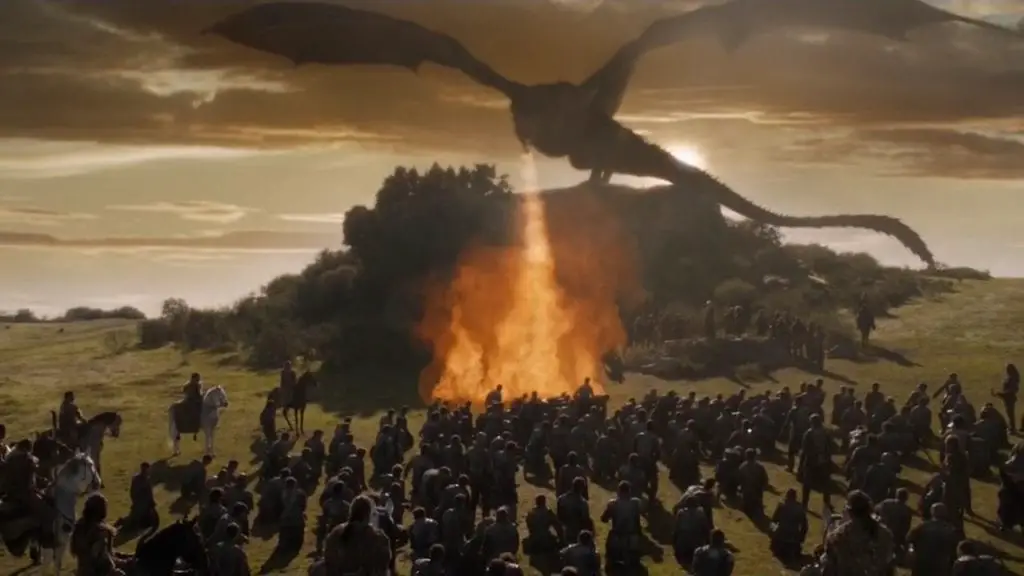
Yeah, of course she wants to be liked. But she could easily take the stupid throne in 12 seconds, and then you know…rule in a way that is compassionate. Especially since we’re told that nobody likes Cersei. There’s a pretty easy spin here in all of this: Cersei is the horrible woman who blew up the church, and Dany is the magic queen with dragons. We’re quite sure we can guess which side notoriously superstitious people would think the gods want them to be on.
Unless Cersei really did cast off the yolk of superstition…
In fact, why didn’t Dany try to appeal to the Faith leaders that are still around? We’d guess there’s a septon somewhere who wasn’t too pleased with the events of Season 6. Oh Brother Ray, you were taken from us too soon!
In summation of…everything we’ve been babbling about here, not using the dragons was dumb. It’s another contrivance in a long list of contrivances designed to keep Cersei around as an enemy for another year.
We also want to touch on the “abandoned island” aspect of Dragonstone. Yes, we find it hilarious that it’s abandoned, as if the hundreds of workers required to keep a castle running just ditched the place (exactly how many boats did they have at their disposal for such an endeavor?). Yes, we find it equally hilarious to envision Ellaria providing Dornish cooks after Dany’s arrival, and their spicy food is the reason why Emilia Clarke was able to move her face a bit more than normal this season.
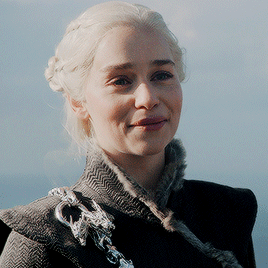
But more so, we find it to be an incredible missed opportunity, particularly in the context of the wheel-breaking, “justice for the smallfolk” dialogue we’ve been treated to all season. This is the chance to show smallfolk reacting to Dany. Hell, to show Westerosi reacting to Dany, as this is the first place she landed. For six years we had back and forths about how Dany might be received, how Westerosi might feel about Targaryens, or dragons coming back. We’re very sympathetic to not wanting to film a battle in the first episode, but it’s not like that was the only option had people still been there.
Maybe Dany has to immediately use the force of her dragons, and it makes her feel conflicted about this whole homecoming thing. Maybe the smallfolk there instantly cave and invite her in out of fear, and that’s what motivates the lines about her not wanting to rule as “queen of the ashes.” Maybe the smallfolk are in awe of the dragons, consider her almost god-like in her power, and it emboldens her to think the dragons should be used more in the war effort.
Dany’s dragons, Dany’s Targaryen-ness, and how smallfolk of Westeros specifically react to her is the crux of everything her journey has led to. It’s the crux of Tyrion’s horrible, horrible military plans. The fact that D&D didn’t even think smallfolk could exist inside of a castle without a direct ruling Lord, or at least assumed that their viewpoints weren’t important enough to show at any point really tells us more about how they feel about their stupid social justice lip-service than anything else we could say.
Then, to be frank, we’re completely at our wits end with this “break the wheel” thing. Tyrion full on yells after Dany at one point that she’s too important to lose because they’ll never break the wheel without her. However, if this really is about social justice and breaking down the feudal order for the good of the smallfolk, Dany is not especially important. Actually, we’d say Jon is a better candidate for this, not just as a bastard king, or as an “heir” to the famously even-handed Starks, or even as Aegon VII VI Targaryen. Rather, as the guy who is so tunnel-visioned on humanity’s survival that he doesn’t seem particularly conscious of the system in the first place. March south to meet the Targaryen Queen! Why not?
It’s like D&D are trying to have their cake and eat it too. They want Daenerys to be the rightful queen and have this claim, and come into contention with Jon over it, but they also want her to be this ~strong feminist reformer~ for very limited understandings of strength, feminism, and reform.
I’m Not Here to be Queen of the Ashes
However, there’s also this thread of this strong feminist reformer possibly being a power-crazed tyrant, whose only tenuous grasp on humanity is kept alive by Tyrion’s words of wisdom. And also maybe this new romance of hers.
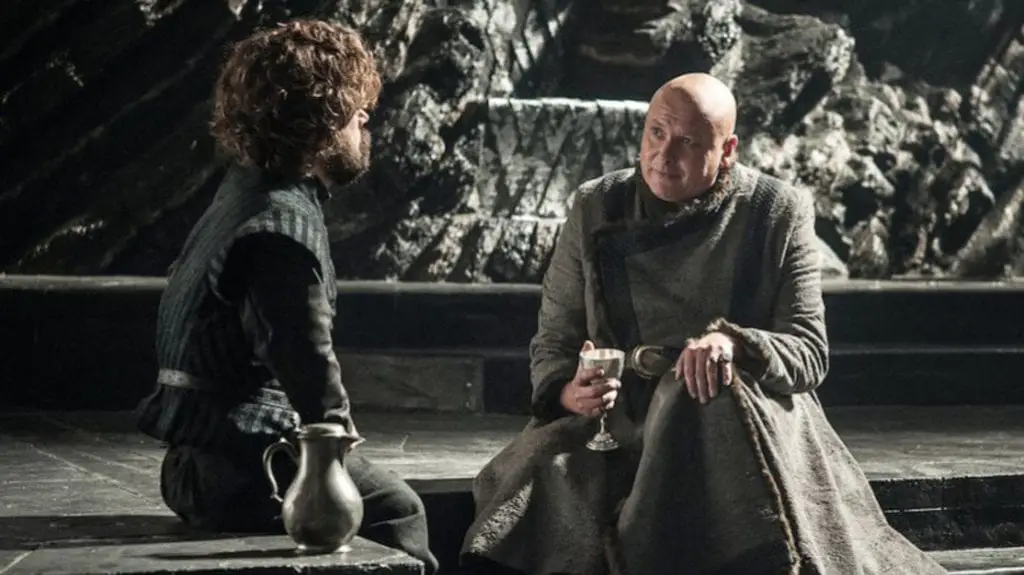
This is not even us bitching about the demonization of female agency due to mere implications (which, like…we’ll happily do for you). This is the outright text of this season. Varys and Tyrion have a conversation about how Dany needs to listen to him or else it’s the Mad King all over again. Tyrion says to Cersei that the only thing separating these two women—when everyone including the showrunners call Cersei an insane, murderous person—is the mere fact that Dany will listen to Tyrion. We repeat: this is actual text.
Tyrion: Daenerys is not her father.
Varys: And she never will be with the right counsel. You need to find a way to make her listen.
Then pepper in the instances where Dany does use her dragons. At the end of “Spoils of War,” Dany melts most of the Lannister forces and provisions, while Tyrion watches from a hill and frowns. (We’d be frowning too if our reasons for supporting her included better treatment for smallfolk and here she is, burning food. But we’re not sure the showrunners even realized that was happening.)
The opening of the next episode, Dany burns Randyll and Dickon Tarly to death, because they won’t bow to her, unlike the other Lords who did so when Drogon scared the crap out of them. (Or other…random soldiers. Let’s assume a mixed group of Lords and soldiers.) Tyrion argued vehemently against this execution-by-dragon, but Dany could not be persuaded, and Randyll wasn’t exactly taking the outs given to him, either.

D&D tell us in the “Inside the Episode” that the viewer should draw their own conclusions about morality. However, in our view, the clear focus was Tyrion’s concern, which then fed right into the aforementioned Varys conversation. In fact, the closest thing Tyrion has to an arc this year is the task set forth by Varys: get Dany to listen to you. He suffers a setback at the beginning when all his plans turn awry, but his moment of triumph is in the finale, where he convinced the likes of Cersei to side with him. (Except yes, he really didn’t, but it’s the presentation of this as a resolution. “Tyrion Lannister, motherf-ckers”.)
This subplot was explicit in Episode 2, when Tyrion tells Dany that she’s not there to be “queen of the ashes,” which she later parrots. So keeping Dany’s murdery tendencies (or something) in check were a focus very early on. Add to this the scene where all of a sudden Dany seems paranoid and like she’s threatening Tyrion, who is all of a sudden afraid of her.
Tyrion: Your Grace, I saw hundreds of arrows fly towards you when you fought on Blackwater Rush, and I saw hundred of arrows miss. But any one of them could have found your heart and end—
Dany: You’ve been thinking about my death quite a bit, haven’t you? Is this one of the items you’ve discussed with your brother in King’s Landing?
Tyrion: I’m trying to serve you by planning for the long term.
Dany: Perhaps if you’d planned for the short term, we wouldn’t have lost Dorne and Highgarden. We will discuss the succession after I wear the crown.
The framing is almost like Tyrion is this hero who is putting himself in danger for standing up for the greater good, especially since Cersei is so underhanded and tricksy that the high road isn’t always a successful one. Tyrion outright champions this restraint to his family, saying that he’s doing what he can to prevent them from dying.
On the other hand, he keeps going on about how he sincerely believes Dany’s rule will make the world a better place. Maybe she’s just that complicated, or maybe the writing is just that confused.

The thing is, we can’t figure out what we—the audience—are supposed to make of Dany. Neither can D&D, hence “draw your own conclusions.” But the messaging is there and inescapable, as we said in our King’s Landing analysis, and as Kylie said in her Season 7 sexism piece. Dany, a ruling woman, is better than Cersei, the other ruling woman, because Dany listens to Tyrion. That’s what we’re meant to see in all of this, because that’s what is made very explicit.
Now that we’re writing this out, we realize that Tyrion is actually the dude with the social justice credentials, not Dany (and Jon’s are more incidental at this point). Tyrion has been championing them since the first season, back when he was lecturing Jon on classism and telling him to check his privilege. He’s always been the one who’s been more comfortable with the smallfolk, and he’s always advocated for them, even with Joffrey, for example. He’s even quite into upward mobility, which is why we got Bronn as the head of the City Watch during Season 2, for some reason. (Please note: this is only in the show, and the largest reason we’ve been referring to this paragon as “Saint Tyrion” for three years now. Book!Tyrion is maybe the biggest snob in the entire series.)
So…“break the wheel” is Tyrion’s agenda. At least, he’s the only one bringing it up consistently here, other than Varys. And since Tyrion’s mission is to control Dany, it’s kind of like we’ve just got this puppet queen here. Sure, she’ll run to save the other idiot man in her life without Tyrion’s approval—which D&D confirm is because of tinglies in her nether regions as opposed to say, saving this super-necessary dragonpit meeting—but she’s really not the one standing for anything, except her own sense of entitlement. She understands she has to do good to secure this claim, but it’s all filtered through the terms of Tyrion, and later Jon.
Meanwhile, we see that Dany’s unchecked instincts are conqueror’s instincts. Her boyfriend even told her that last season! “You’re a conqueror.” Violence is actually her go-to, like in Vaes Dothrak last season, or the war planning session in “Stormborn,” or with the Lannister prisoners of war in “Eastwatch.” Maybe what we saw this year was her taking Olenna’s advice, but more and more we think this is just her personality, especially given her behavior since Season 3.

Really, all we’re saying is something we’ve been saying since last year. Dany and Cersei are not wildly different characters. The difference is the marketing, and they get different marketing based on their willingness to listen to men in the room. Cersei is uniquely evil because she planned with Euron without checking in with Jaime. Dany, meanwhile, was all aboard the most unnecessary truce offering possible, suggested by Tyrion and Jon.
Believe it or not, D&D actually marveled at how in Episode 2, it was four powerful women standing around the war table, strategizing. And yet if you actually watch that scene…the only strategy was coming from Tyrion. The same exact damn thing happens with the dragonpit meeting. Cersei and Dany patiently watch Jon and Tyrion’s presentation. We honestly suspect that D&D think they’re giving us this powerful, progressive, female ruler. But for some reason, they can’t get past the idea that if women are allowed to make unilateral decisions, it’s somehow nefarious or downright evil. The scripts confirm that Sansa was supposed to be “up to something” in Winterfell, and if that’s not proof enough, then we honestly can think of nothing more to convince anyone.
Dany’s not here to be queen of the ashes or to put people in chains. But that’s because Dany has no idea what she is here to do, and neither do D&D, it seems.
Only a King can Convince a Queen
D&D seem far less confused in terms of what they think Jon is here to do. He’s the big damn hero with the big damn destiny (as rightful heir of the throne). He’s also the unwavering voice of morality and honor, who cannot tell a lie, and from what we can tell, the narrative treats his Kingship as something very earned—a rags to riches story. In fact, that’s quite literally how D&D described his arc last year: he started out dead, and ended up king…not bad!
We clearly struggle with viewing Jon in this light, because as we pointed out last year, he didn’t do anything particularly to earn that Kingship other than making the dumbest possible choices and getting bailed out by his sister. Then, as we pointed out at the start of this piece, his entire journey this season is something we view as once again, dumb, and once again, taken care of by his sister. Who was it keeping anxious Northern Lords in check?
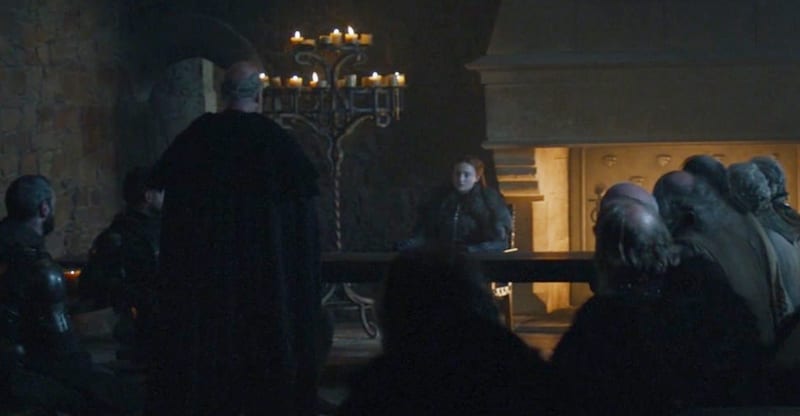
While we fully admit that while we’re more compelled by Sansa’s arguments regarding castle inheritance at the beginning the season, Jon at least made points there. But the idea that Jon has this unshakable honor that sets him apart from everyone else and makes him so worthy of Dany (who clearly needs help in this department), doesn’t feel very supported to us. Not judging a son for his father’s crimes is a fine sentiment—one we’d even agree with—but yet, Jon isn’t exactly unique in voicing this, since Dany says quite literally the same thing to him in their first meeting. In fact, it felt like such an intentional parroting that we think it was supposed to be drawing amazing parallels between them.
“And I ask you not to judge a daughter by the sins of her father.” —Daenerys, “Queen’s Justice”
The only other “super honorable” action we can think of is when he could not tell a lie to Cersei, even with this potential and supposedly crucial truce on the line. Ignoring the issue that this truce doesn’t solve anything at all, he basically was willing to gamble the fate of humanity on keeping his personal conscience clean. We suppose that’s “honor,” but a very rigid definition, and one that doesn’t really echo Ned in any way. Nor does it strike us as wise or prudent leadership. Jon just arbitrarily wanted to be truthful one day, and wrongly associated Ned as having that trait.
In Season 1, we saw Ned agree to lie, to say that he committed treason and conspired to take Joffrey’s [rightful] throne. And he did this to save Sansa. Then, in Season 6, whatever we think of it, we were purposely given a window to view Ned as “dishonorable” for having bragged about a sword fight that was only won when one of his buddies stabbed his foe in the back. Yes, we don’t think it was dishonorable, but it’s clear as day that D&D did.
Being very, very generous, we could say that Jon wasn’t the one given the window from Season 6, so he wouldn’t know to question Ned’s honor. We’re just questioning where the hell this “father never lied” thing came from. Was it also when he learned that “father never cursed in front of girls?” Are D&D so lazy that they think they can just retcon character traits in like this for Ned?
Oh wait…yes.
Frankly, Jon arbitrarily ascribed himself as needing to be stringently truthful under all circumstances too. Remember how he faked his defection from the Night’s Watch to infiltrate the wildlings, and he did so for what he viewed as the greater good of his order, as well as Westeros at large? We spent two seasons exploring that? Living the falsehood had a toll on him certainly, especially since he fell in love with Ygritte along the way, but he still went along with the lie because his honor, and the situation, demanded it.
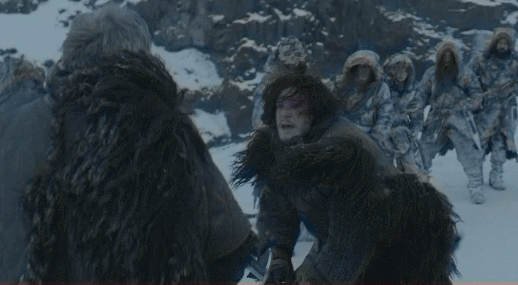
It’s not like Jon refusing to lie to Cersei was unclear: D&D are obviously trying to show him as a good leader who doesn’t have an interest in this back-stabby game. It’s just that we don’t exactly find it convincing either. It seems more meaningless than anything, as if they’re just lazily writing dialogue in a way that we’re encouraged to root for Jon, without actually engaging with his philosophy, or anyone else’s for that matter.
Then add to it the fact that Jon’s refusal to “play the game” is one that could actually have pretty disastrous results for his people, and all of Westeros. It will matter to the North that he kneeled, as it mattered to them that their king was willing to just march in and be taken prisoner. Then he risked everyone’s lives (in theory), because telling lies gives him a weird feeling in his tums. Really, Jon is damn lucky that no one actually needed the truce, since he came to the table apparently unwilling to negotiate a single thing. Once again, whatever qualities were supposed to have earned him this kingship are just lacking.
We also have to talk about his big, quasi-magical destiny. See this year, in case we missed it last year because D&D can’t construct stories, we were told very bluntly that Jon is “the heir to the Iron Throne.” Another thing he did absolutely nothing to earn! (Which also hinges on whether or not people consider deposed hereditary monarchies as still having rights to the throne.)
Oh, and his name is Aegon. Because Rhaegar was just that awful. For any potential non-book readers out there: “Aegon” is the name of Rhaegar’s son with Elia Martell. You know, the wife he apparently unilaterally annulled ties to (and thus disinheriting his two living heirs) in order to marry Lyanna. We are prepared to flip our coffee tables if anyone unironically calls Jon “Aegon Targaryen” in Season 8.
Our question is: what are we meant to make of this information? Are we supposed to think Jon is a really great fit for the Iron Throne? Are we supposed to be super worried about his romance with Dany because now their claims are in competition? Are we supposed to be really freaked out about the explicit incest or the head-scratching parallel made to Rhaegar and Lyanna? It wasn’t exactly a happy story there…

Well, according to D&D, this “changes everything.” We are supposed to think all of these things, and it makes everything super muddy. And boy what a shame the whole aunt/nephew and competing claims thing exists, because otherwise this would have been a perfect love story.
We have many follow-up questions now, though our main one is about why is this assumed to be a political problem for either Jon or Dany. They both have claims, so they can marry each other and rule together. It’s frankly kind of a perfect solution. And how convenient—they’re also in love!
Regarding the aunt/nephew thing…how convenient—they’re Targaryens. Plus, this show has spent the past three years hammering home that “we don’t choose whom we love.” Even though an audience with modern day sensibilities is unlikely to support an aunt/nephew pair, we don’t really see this as a problem within the universe. Frankly, maybe we have a radical view, but these guys weren’t even socialized as aunt/nephew and they’re the same age with relatively equal power in the relationship (or at least spent most of their time as equals…this doesn’t feel like Dany ordering Daario to remove his clothes, for instance), so the main issues we’d usually have with such a pairing don’t apply here.
Also, we hate to be pedants (no we don’t), but while D&D can talk about the inherent weirdness and muddyness of the aunt/nephew thing, that’s not presented in the show at all. There was not any remote foreboding in the boat sex scene in terms of framing or musical cues. It was just an overly-saccerine love scene, which felt out of place only because we don’t recall these two falling in love. So, it’s fine if D&D are trying to tell an ambiguous story, but that needs to be communicated through the visual language of film to the audience, rather than told in post in a YouTube video.
We don’t view the “Aegon reveal” as particularly groundbreaking this year, since once again, the only guy whose reaction even matters anymore is still in the dark about it—that being Jon himself. As for his magical kingly destiny, we still think the guy is a moron who really shouldn’t be sitting in any seat of prominence, let alone the Iron Throne. We just can’t get there in feeling excited about it, or feeling as though it’s motivated and the culmination of seven years of character building. But of course, a lot of that is because the past four seasons just involved Jon swinging a sword really, really well.
The one thing we’re feeling is dread, because we can easily see this ending as Dany sacrificing herself for Jon’s benefit. After all, her magical destiny was already fulfilled in Season 1, and his is just starting. However, we have to backtrack slightly and say something nice: Jon’s arc this year was not just about him swinging a sword. In fact, he barely swung it at all. So what does that make his arc instead?
The biggest thread we can find is Jon’s decision to trust Dany and kneel to her. We suppose this is part and parcel with them falling in love, or wanting to schtup each other, or whatever, but we’re trying to consider Jon’s character journey in isolation for now. He went to Dragonstone with one purpose: dragonglass. The one reason he wanted dragonglass was to save humanity. However, he refused to kneel, with Dany even calling this pride at one point.
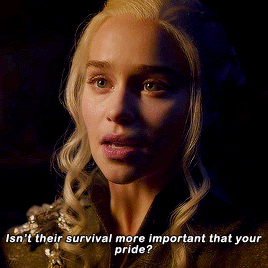
Jon’s initial stance was that “there’s no time” to kneel, and he “doesn’t know” Dany. We can easily ignore that first point, because what? But the second point is what we think his arc is: he comes to know her, place trust in her, and eventually kneel to her. Tying back to Dany’s comment, this is also him swallowing his pride, though we’d be lying if we said we saw Jon draw much pride from his kingship in the first place. In case you forgot, Jon posits the same exact question to Mance Rayder in Season 5, and in one of the walk-and-talks in “Beyond the Wall,” Tormund criticizes Mance’s pride as being the reason so many wildlings died. Which…wasn’t exactly how that shook out seeing as Mance’s refusal to kneel only really affected his execution, but we guess that was a nice callback.
However, that makes Jon’s own refusal to kneel in the first place make even less sense. Pride has never exactly been a character trait of his (at least, not since Season 2, and even there it was more ignorance), and we’re instead left with him arguing nonsense.
Jon: If we don’t put aside our enmities and band together, we will die. And then it doesn’t matter whose skeleton sits on the Iron Throne.
Tyrion: If it doesn’t matter, then you might as well kneel.
Jon: There’s no time for that!
As far as we can tell, Jon simply didn’t bend the knee, so that he could later. Dany outright says she’ll “fight for the North” once he does so in just the second episode they share together—you know, saving humanity, as far as he’s concerned—and still…nada. There was a vague idea that his Lords wouldn’t be happy, but given that he just told Sansa about the kneeling in a letter after the fact, it doesn’t seem like he was really all that concerned. Plus, we’d think the “she’s here to save our lives from the zombies” angle would have played just fine.
Still, okay! Jon had an arc! We don’t find it particularly compelling, unfortunately, mostly due to the completely tepid nature of the romance. It was, after all, Jon’s supposedly evolving view of Dany that ultimately moved him to kneel. We could restate what Kylie’s already argued, but hopefully the recap already conveyed that while many people told Jon and Dany they liked each other, the actual content of their scenes together didn’t exactly evince it. In fact even just if it was lust, we got more from Emilia Clarke’s reaction to Jorah than to Jon.

We also find it slightly odd that Jon’s arc is about coming to love and respect Dany, even going as far as to say the Northerners will ‘see her for what she is’ as a way of justifying his kneeling, while we’re also treated to scenes of Tyrion and Varys wringing their hands and worrying how she’s the Mad King reborn. But hey, tonal contrast has been a mainstay of this show for the past few years, so why not.
You know, we really do have to applaud D&D for successfully muddying the waters though. After all, we now know only a King can convince a Queen, so now how will Jon convince Dany of anything after kneeling? We can’t wait to see that unfold in season 8.
Tyrion’s crooked halo
Real talk for a moment: we get very, very paranoid that we are too taken by our nicknames and jokes to actually analyze this show anymore with a remotely objective lens. So, this season when Tyrion obviously and massively screwed up, it was very clearly an implicit challenge to one of our favorite nicknames of all: Saint Tyrion.
You see, we assigned that name, because Tyrion met the standards of the trope “Mary Sue,” and we didn’t think to just add “sue” to a name until Ramsay. As a refresher:
[The Mary Sue]’s exceptionally talented in an implausibly wide variety of areas, and may possess skills that are rare or nonexistent in the canon setting. She also lacks any realistic, or at least story-relevant, character flaws — either that or her “flaws” are obviously meant to be endearing. […] The canon protagonists are all overwhelmed with admiration for her beauty, wit, courage and other virtues, and are quick to adopt her as one of their True Companions, even characters who are usually antisocial and untrusting; if any character doesn’t love her, that character gets an extremely unsympathetic portrayal. She has some sort of especially close relationship to the author’s favorite canon character — their love interest, illegitimate child, never-before-mentioned sister, etc. Other than that, the canon characters are quickly reduced to awestruck cheerleaders, watching from the sidelines as Mary Sue outstrips them in their areas of expertise and solves problems that have stymied them for the entire series.
We do feel this still mostly describes Tyrion, and to be honest, most of the reason we emphasize this so strongly is because his book character is such a schmuck. It’s literal night and day with their function in the story and the type of person they are, as well as the way their decisions are framed.
Clearly, we’re beyond the books now, so what Tyrion should have been is hardly relevant. And like we said, this year Tyrion done donked up. He suggested the most obviously imbecilic battle plan that one could conceive given the political and militaristic landscape of Westeros when Dany landed. He also received negative feedback for this. Dany yelled at him for not considering the “short term” and losing all her support. Tyrion even admitted that Jaime made him look “a complete fool” with the fake-out at Casterly Rock. That does not exactly sound like an overly competent character solving problems no one else could.
Except. Most of our issues are with framing, but to get the elephant in the room out of the way, it’s kind of hard to consider this show on a Watsonian level. It’s been hard for many years now. And in this case specifically, how are we supposed to consider the implications of Tyrion splitting up Dany’s forces, when the reasons it happened were so obviously due to her being too overpowered in the narrative? As we said, D&D make this explicit in interviews. It’s the same reason why it was hard to consider the implications of Marg’s careful navigation of the Faith, when at the same time Cersei was trotting around unsupervised after being accused of high treason.
Ignoring the contrivances of the military beats (which…why should we?), Tyrion’s “failures” have to be taken in the context of his primary goal: control this unstable, paranoid woman so that he can bring about a socially just utopia. We’ve talked through why that’s silly, but that is his mission nonetheless. Varys explains this in very blunt terms.

So Dany—the crazed tyrant that burns people alive—criticizing Tyrion’s plan has much less impact than it should. In fact, she comes across seeming short-sighted and unreasonable, because she refuses to recognize the danger of smallfolk hating her if she uses dragons, or something. We’re not compelled by that argument, but we know the audience is supposed to be, because that’s how it’s framed. That’s apparently how you break the wheel, and boy are we meant want that wheel to break.
As we’ve discussed, that is Tyrion’s agenda more than Dany’s. Which means her criticism of him is more like, a hurdle he needs to overcome, rather than genuine criticism we’re supposed to agree with. You can agree with it—as we do—but we’re talking about its position within the narrative.
Our biggest argument for why this is the case is in the culmination of Tyrion’s arc this year. In fact, that’s the culmination of the entire season’s story, since it’s at the dragonpit meeting, where all plotlines converged. (Except Sansa’s, because she’s so ambitious and disloyal.) The meeting’s resolution was in the moment where Cersei came back into the pit, said she’d pledge troops, and then everyone looked at Tyrion. And…well…
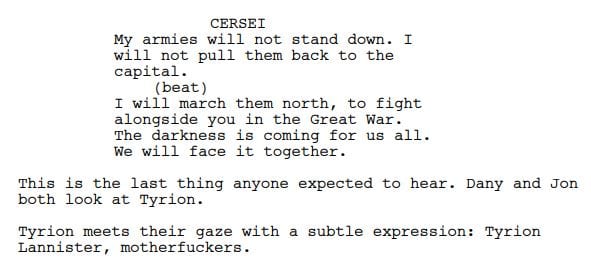
Now, we know it was a clever ruse of Cersei’s, but that was revealed until later, and was also much more indicative about how “monstrous” she is. Poor Tyrion having to deal with all of these dishonest, duplicitous people. Who can blame him for failing (temporarily) when he has all the of the best intentions and they don’t?
Oh wait, that was his exact arc last year! Which had been a lazy rehash of Season 2! Last year, he was rewarded with the Handship. This year, he got the admiration of all of Team Deadpan, even if no one wanted to play Scrabble with him later.
Yeah, he was fallible this year. But he was fallible in the same way he’s always been, and not in a way that actually relates to a single character flaw. If he has a flaw, it’s that he’s too good in this corrupt world, while at the same time being snarkily cynical and savvy about navigating it. We guess that makes him slightly better written than the typical Mary Sue, but not by a whole lot. And once again, this is a stagnant character. We have every confidence that by season 8, his halo will be nice and straight.
At least he didn’t need to learn to love himself again.
We were told by Peter Dinklage, however, that he did learn to love Dany, and by that we mean he’s apparently ‘falling in love’ with her. To be blunt, this was so not in evidence in any way, shape, or form, that we feel comfortable dismissing it as Dinklage’s apparently Emmy-earning honeypot to make sense of his character’s motivations until the show otherwise incorporates this. Which, forgive us for not holding our breath.

A Belabored, Moot Point
We’re very, very sorry; we just can’t let it go. The politics underwriting this season were so painfully dumb. They weren’t even pretending to be smart like Season 5’s King’s Landing plotline. They were just nakedly “we need this to happen, and it will.” We don’t want to write about this again, but every time we revisit it, we marvel at just how incoherent it is. And it taints absolutely everything. How are we supposed to understand character motivation, when this is what happens:
Jon: I need to go home.
Dany: You said you don’t have enough men.
Jon: We’ll fight with the men we have. Unless you’ll join us.
Dany: And give the country to Cersei? As soon as I march away, she marches in.
MARCHES INTO WHERE? WITH WHAT TROOPS? Is this about Dragonstone, the empty castle they stumbled on? Didn’t all the remaining Lannister forces kneel to Dany? Can’t she just take them up North too? Also Jon, you total dolt, you almost got the entirety of your Northern and wildling supporters killed by ‘fighting with the army you had’!
The dragonpit meeting is so, so bad. It brings the action of the season to a screaming halt—as random and teleporty as the action had been— and there’s all this framing to try to get us to see this as the hugest thing that had ever happened in the history of Westeros. Everyone who’s anyone is there, deciding the fate of humanity, after all. But no! We just spend thousands of words in this essay, in addition to others, pointing out that nothing of significance is being decided here, or was decided, or needed to be decided in the first place!
Yes, we could pick this apart more. We could question where the Unsullied were marching before this meeting invitation went out, since we’re pretty sure they can’t swim to Dragonstone. We could question what Lords Jaime was commanding in the final episode to march north with him, because aren’t they all Dany’s now? We could even question why Dany wasn’t allowed to fly up to poach a wight in Drogon’s talons in the first place. Stray arrows, we guess.
But the fact remains, Dany and Jon were asking for a truce from someone who held no land, and commanded no army save for the Iron Fleet. Then they saw Euron “walk out” on Cersei, adding to the ridiculousness of it all. So Jon’s refusal to lie dooming them all…no. Tyrion saving the day…no. Team Deadpan gaining anything at all? We can keep going.
It’s plain old bad. We have no other words. The show, it is bad. Our only comfort is that some critics seemed to have realized that this year, even if they’re not quite willing to fully say it, or like, stop chucking wholly undeserved Emmys its way.
Well, maybe next year.

